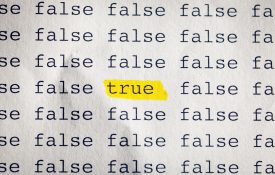-
How Do We Make Moral Judgments? – Insights From Psychological Science
New research published in Psychological Science, a journal of the Association for Psychological Science, provides intriguing insights into some of the factors that influence how we make moral judgments. Reappraising Our Emotions Allows Cooler Heads to Prevail We might like to think that our judgments are always well thought-out, but research suggests that our moral judgments are often based on intuition. Our emotions seem to drive our intuitions, giving us the gut feeling that something is ‘right’ or ‘wrong.’ In some cases, however, we seem to be able to override these initial reactions.
-

Misinformation: Psychological Science Shows Why It Sticks and How to Fix It
Childhood vaccines do not cause autism. Global warming is confirmed by science. And yet, many people believe claims to the contrary. Why does misinformation stick?
-

Prejudice Can Cause Depression at the Societal, Interpersonal, and Intrapersonal Levels
Although depression and prejudice traditionally fall into different areas of study and treatment, a new article suggests that many cases of depression may be caused by prejudice from the self or from another person.
-
Improving Memory for Specific Events Can Alleviate Symptoms of Depression
Hear the word "party" and memories of your 8th birthday sleepover or the big bash you attended last New Year’s may come rushing to mind. But it’s exactly these kinds of memories, embedded in a specific place and time, that people with depression have difficulty recalling. Research has shown that people who suffer from, or are at risk of, depression have difficulty tapping into specific memories from their own past, an impairment that affects their ability to solve problems and leads them to focus on feelings of distress.
-
New Research From Psychological Science
Read about the latest research on cognitive processes related to memory, priming, and decision-making published in Psychological Science and Current Directions in Psychological Science. Independence of Data-Driven and Conceptually Driven Priming: The Case of Person Recognition Stephan G. Boehm and Werner Sommer One of the central tenets of memory theories assumes that data-driven priming (facilitated processing of stimuli based on perceptual information) and conceptual priming (facilitated processing of stimuli based on conceptual knowledge in semantic memory) are independent.
-
Do SAT Scores Help or Hurt in Decisions About Who Will Do Well in College?
Every year, nervous high school juniors and seniors, clutching #2 pencils and armed with hours of test preparation, sit down and take the SAT. At their most basic, these tests focus on verbal, math, and writing ability, and performance on these tests has been linked to subsequent academic performance. As a result, college admissions teams use SAT scores along with other information, such as high school grades, in choosing their incoming freshman classes. It is perhaps no surprise, then, that the SAT has been the subject of much scrutiny.

